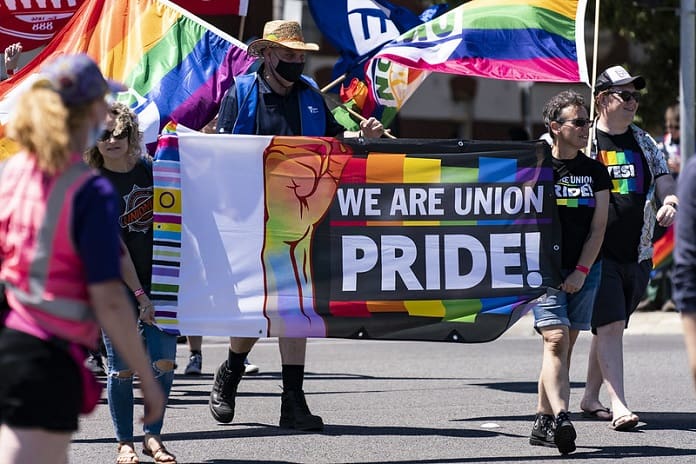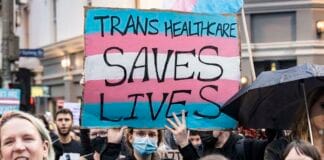UPDATED ON 11 FEBRUARY: Scott Morrison has been humiliated after five Liberals crossed the floor in parliament to vote against him over amendments to the Religious Discrimination Bill. His attempt to wedge Labor over the issue has blown up in his face and the Liberals are in disarray.
Rather than see the amended bill pass the Senate, the Liberals have now dropped it completely, after the Australian Christian Lobby withdrew its support.
The amendment, supported by Labor, would have ended the power of religious schools to expel students both on grounds of sexuality and gender identity. Morrison had refused to protect trans students from expulsion.
The bill is now unlikely to come back to parliament before the election in May.
Labor was willing to vote for a bill that would still have allowed teachers and other workers to be sacked for being LGBTI+ or for anything not deemed acceptable as part of an employer’s religious beliefs, as well as measures that allowed bigotry under the cover of religious “statements of belief”.
It has continually made concessions in an effort to chase the votes of conservative religious groups.
If elected, Anthony Albanese says Labor would legislate to protect students from discrimination on any grounds, including from expulsion, and take action to protect teachers from discrimination at work.
But it is still not clear whether it would end the ability of religious schools to sack LGBTI+ teachers. And it says it would also act to protect religious people from discrimination—without specifying what kind of discrimination it is targeting.
The bill is now set to be an issue right through the election campaign. Morrison will keep trying to use it to spread bigotry and win votes. But his credibility is damaged and his own party is split on the issue.
Further protests and campaigning are needed to drive the Liberals out, and push Labor to end religious schools’ right to discriminate against both students and teachers—and to make sure there are not further concessions to the bigotry of the religious right.
9 FEBRUARY: Scott Morrison is seeking to pass his Religious Discrimination Bill through parliament this week, entrenching discrimination against LGBTI+ people. Shamefully, despite opposition from some Liberal MPs, Labor has left the door open to supporting it.
As this article was published, it was being reported that Labor would move amendments in the House of Representatives but not oppose the bill there if unsuccessful.
Then, Labor will seek to amend the bill in the Senate. If the Senate amends the bill, Labor says it will “insist” on its amendments, and keep sending the bill back to the House until it agrees.
The danger is that Labor will eventually fold and pass the bill to “take the issue off the table” for the election.
Discriminate
Under federal law, religious schools and institutions can already discriminate against students, teachers and other workers with regards to their sexual orientation and gender identity, as well as other characteristics such as pregnancy or relationship status.
Teachers can already be sacked for being LGBTI+, but Morrison’s new bill would allow schools and religious institutions to discriminate against and sack anyone they judged did not uphold their beliefs.
The bill threatens to overturn some state protections against discrimination, such as those in Tasmania and Victoria. And while Morrison has conceded to pressure and now proposes to legislate to protect students from expulsion on the basis of sexuality, trans and gender diverse students could still be expelled. The changes also do nothing to stop other forms of discrimination against students.
The bill would also allow discriminatory “statements of belief”, which could include statements such as a boss telling female workers that “god did not want women in leadership positions” or a doctor telling a patient, “disability is a punishment for sin”.
The bill should be voted down. Protecting religious people from discrimination should not be used as a cover to allow discrimination and abuse of LGBTI+ people.
Karen Pack points out that discriminatory religious practices often end up targeting people of faith, not protecting them. She trained chaplains at Morling College for years before she was fired after controversy over her marrying a woman.
She told ABC’s 7:30, “They’re trying to protect the right of some elements in the church to discriminate, not against people outside, but against people within their very own bodies, their very own churches and families.”
But religious institutions also go far further than just religious schools, and include universities like the Australian Catholic University and Notre Dame, whole swathes of aged care and community services such as CatholicCare and Anglicare, and even retail stores such as Salvos.
Opposition
Despite community outrage, Labor leader Anthony Albanese may yet support the bill, stressing his support for protecting religious people against discrimination rather than recognising that the real threat is to the rights of LGBTI+ people.
Labor’s small-target strategy for the election includes compromising on principles such as LGBTI+ rights, climate, and refugees to help them glide to victory.
Not only is this a big problem, it’s also a risky strategy: Labor’s victory is not guaranteed, as 2019 should have taught us. This makes their promise to wind back some aspects of the discriminatory laws after the election look even more shaky.
The last time Labor unseated the Liberals federally was via a coordinated union campaign, and Labor should do everything in its power to mobilise and galvanise workers behind it, encouraging the union rallies and strikes against the Liberals.
The unions’ role in supporting the marriage equality plebiscite in 2017 showed that LGBTI+ rights are a union issue, and now as much as ever they have a key role in protecting their members.
For months, unions have taken the lead of Equality Australia, calling for amendments and relying on lobbying and parliamentary inquiries. Outright opposition to the bill from the start, including a promise to fight its implementation, would have put them in a far stronger position.
This week, unions have hardened their position calling for the bill to be rejected. On Sunday, the National Tertiary Education Union’s ACT Division supported a protest in Canberra calling to stop the bill’s passage. And the Independent Education Union launched a petition against the bill, signed by more than 3000 people.
There have also been voices of opposition inside Labor. NSW Young Labor Left has launched an urgent rank-and-file petition of Labor members: “Labor must oppose the ‘Religious Discrimination Bill’.” Some state Labor caucuses have opposed the bill, and the ACT Chief Minister Andrew Barr called on Labor to oppose the bill.
Outrage
There has been consistent outpouring of community outrage about the right to discriminate ever since Morrison first floated the legislation in 2018, when one poll found 74 per cent opposed religious schools discriminating against students and staff on the basis of sexuality and gender identity.
Most recently, community outrage centred on an enrolment contract by Citipointe Christian College which required students and parents to affirm that “homosexual acts” and “bisexual acts” were sinful, and that the college has the right to “exclude” trans students. Protests outside the college and over 150,000 signatures on a petition saw the contract withdrawn and the school’s principal, Brian Mulheran, resign.
Morrison is under a lot of pressure from inside his party, both on his right from people like Amanda Stoker, and from “moderates” including Bridget Archer, Warren Entsch, Trent Zimmerman and Andrew Bragg, who have threatened to vote against the bill.
We can’t rely on moderate Liberals to stop the bill. Labor’s support would guarantee the passage of the bill, even if a few Liberals crossed the floor. Opposition inside Labor and community mobilisation are needed to force Albanese to take a stand. Should the bill pass, it will be up to unions to fight any implementation of discriminatory rules.
By Sophie Cotton





